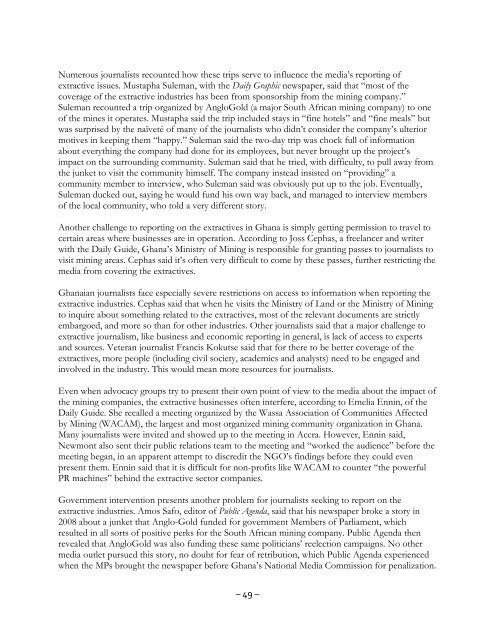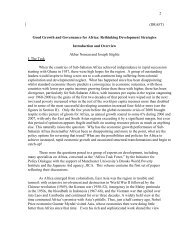state-funded newspapers seemed to have the best computers – new Apple desktops – and it seemsfair to assume that they may have been donated to the government.Moreover, given the relatively low salaries of journalists, many are unable to cover even basicjournalism-related expenses themselves, like travel or research materials (though many said theywould if they could). A few dedicated journalists said they spent their own money to travel to otherparts of Ghana to report on important stories, but that this practice was costly and unsustainable.George Frimpong, of the Chronicle, said that “as long as there is poverty, there will be a problemwith resources <strong>for</strong> journalists.” Hopefully, some alternative can be developed to provide suchresources to journalists be<strong>for</strong>e Ghana eradicates poverty.Challenges to reporting on the extractive industries in GhanaReporting on the extractive industries in Ghana presents a series of challenges specific to the sector.These challenges include the vast resources of the extractive sector businesses themselves (which areused to great effect at self-promotion and the buying-off of media organizations), a profound lack ofexpertise on extractive issues among Ghanaian journalists, government intervention in stories criticalof the extractives and a general lack of interest among the media-consuming public (and journalists)about the negative impact of extractive industries on Ghana.Foremost among these challenges is the great imbalance between the resources of the Ghanaianmedia and the resources of the extractive sector companies. The latter, of course, dwarf that of theGhanaian media. Indeed, the Ghana public relations budget <strong>for</strong> Newmont, a prominent Americanmining company with major operations in Ghana, is probably comparable to the budgets of severalof Ghana’s larger private dailies combined.Extractive sector businesses use their resources in several different ways, some direct and someindirect, to influence coverage of their activities, according to those Ghanaians interviewed <strong>for</strong> thisreport.Firstly, extractive industry businesses are major advertisers in Ghanaian newspapers. Theseadvertisements affect coverage because, oftentimes, newspaper publishers don’t want to risk loss ofincome by publishing stories critical of the extractives sector companies that are also buying space inthe newspaper. Ama Achia, a reporter with Public Agenda, said that mining companies effectivelybought off much of Ghana’s media, because, she says, the media “cannot bite the hand that feedsyou.”The extractive industry companies are also able to affect coverage by controlling the stories that arewritten about the industry. On the one hand, some journalists allege that some companies essentiallypay journalists directly <strong>for</strong> positive coverage. Much more common, according to journalists, is thepractice of companies funding junkets <strong>for</strong> journalists to travel to areas in Ghana where the extractiveindustries are present (most often the mining areas of Ghana, as oil is still a new sector). Thesejunkets, usually luxurious, with journalists put up in extravagant hotels and fed in expensiverestaurants, are usually scheduled down to the minute, so that journalists only receive the companyline. As noted above, journalists are not able to take these trips on their own, <strong>for</strong> lack of fundingfrom their media houses. There<strong>for</strong>e, these trips are often the only occasions during which reportersexperience the extractive industries firsthand. If these company-organized trips are the sole influenceon journalists’ perception of extractives, then obviously their reporting will reflect that perception.– 48 –
Numerous journalists recounted how these trips serve to influence the media’s reporting ofextractive issues. Mustapha Suleman, with the Daily Graphic newspaper, said that “most of thecoverage of the extractive industries has been from sponsorship from the mining company.”Suleman recounted a trip organized by AngloGold (a major South African mining company) to oneof the mines it operates. Mustapha said the trip included stays in “fine hotels” and “fine meals” butwas surprised by the naïveté of many of the journalists who didn’t consider the company’s ulteriormotives in keeping them “happy.” Suleman said the two-day trip was chock full of in<strong>for</strong>mationabout everything the company had done <strong>for</strong> its employees, but never brought up the project’simpact on the surrounding community. Suleman said that he tried, with difficulty, to pull away fromthe junket to visit the community himself. The company instead insisted on “providing” acommunity member to interview, who Suleman said was obviously put up to the job. Eventually,Suleman ducked out, saying he would fund his own way back, and managed to interview membersof the local community, who told a very different story.Another challenge to reporting on the extractives in Ghana is simply getting permission to travel tocertain areas where businesses are in operation. According to Joss Cephas, a freelancer and writerwith the Daily Guide, Ghana’s Ministry of Mining is responsible <strong>for</strong> granting passes to journalists tovisit mining areas. Cephas said it’s often very difficult to come by these passes, further restricting themedia from covering the extractives.Ghanaian journalists face especially severe restrictions on access to in<strong>for</strong>mation when reporting theextractive industries. Cephas said that when he visits the Ministry of Land or the Ministry of Miningto inquire about something related to the extractives, most of the relevant documents are strictlyembargoed, and more so than <strong>for</strong> other industries. Other journalists said that a major challenge toextractive journalism, like business and economic reporting in general, is lack of access to expertsand sources. Veteran journalist Francis Kokutse said that <strong>for</strong> there to be better coverage of theextractives, more people (including civil society, academics and analysts) need to be engaged andinvolved in the industry. This would mean more resources <strong>for</strong> journalists.Even when advocacy groups try to present their own point of view to the media about the impact ofthe mining companies, the extractive businesses often interfere, according to Emelia Ennin, of theDaily Guide. She recalled a meeting organized by the Wassa Association of Communities Affectedby Mining (WACAM), the largest and most organized mining community organization in Ghana.Many journalists were invited and showed up to the meeting in Accra. However, Ennin said,Newmont also sent their public relations team to the meeting and “worked the audience” be<strong>for</strong>e themeeting began, in an apparent attempt to discredit the NGO’s findings be<strong>for</strong>e they could evenpresent them. Ennin said that it is difficult <strong>for</strong> non-profits like WACAM to counter “the powerfulPR machines” behind the extractive sector companies.Government intervention presents another problem <strong>for</strong> journalists seeking to report on theextractive industries. Amos Safo, editor of Public Agenda, said that his newspaper broke a story in2008 about a junket that Anglo-Gold funded <strong>for</strong> government Members of Parliament, whichresulted in all sorts of positive perks <strong>for</strong> the South African mining company. Public Agenda thenrevealed that AngloGold was also funding these same politicians’ reelection campaigns. No othermedia outlet pursued this story, no doubt <strong>for</strong> fear of retribution, which Public Agenda experiencedwhen the MPs brought the newspaper be<strong>for</strong>e Ghana’s National Media Commission <strong>for</strong> penalization.– 49 –
- Page 1 and 2:
THEREWILLBE INKA study of journalis
- Page 3 and 4: AcknowledgementsThis paper has bene
- Page 7 and 8: Executive SummaryPurpose of the Rep
- Page 9 and 10: journalists in these countries that
- Page 11 and 12: Existing International Training Opp
- Page 13 and 14: • Consumer Affairs and Informatio
- Page 15 and 16: Background 3Of the three countries
- Page 17 and 18: pervasive conflict in the Niger Del
- Page 19 and 20: 3) Crises or disruptions, where som
- Page 21 and 22: Low pay and low regardOne of the mo
- Page 23 and 24: Even in cases where working journal
- Page 25 and 26: But while some reporters think FOIB
- Page 27 and 28: When asked how much the media could
- Page 29 and 30: the effects of these challenges for
- Page 31 and 32: detailed analysis of the opportunit
- Page 33 and 34: journalist said he has, however,
- Page 35 and 36: completely make use of some of the
- Page 37 and 38: money. Their knowledge of what medi
- Page 39 and 40: Notes on conducting research in Nig
- Page 41 and 42: Ghana- 35 -
- Page 43 and 44: evenues each year,” 106 which wou
- Page 45 and 46: entertainment news, scandals, and p
- Page 47 and 48: The rise of business-focused journa
- Page 49 and 50: coverage of the oil industry is als
- Page 51 and 52: needed supplementary income to cash
- Page 53: as supporting one political party o
- Page 57 and 58: Training programs available to busi
- Page 59 and 60: Amos Safo, editor-in-chief at the p
- Page 61 and 62: Notes on conducting research in Gha
- Page 63 and 64: Background 136Literacy and Educatio
- Page 65 and 66: “sufficient information” about
- Page 67 and 68: or criminal charges for content the
- Page 69 and 70: have such difficulty obtaining info
- Page 71 and 72: The majority of those interviewed b
- Page 73 and 74: commitment to their profession and
- Page 75 and 76: Notes on Conducting Research in Uga
- Page 77 and 78: Recommendations for Revenue Watch I
- Page 79 and 80: people who have no journalism backg
- Page 81 and 82: analyzes business,” he said, “e
- Page 83 and 84: A journalist with The Punch said,
- Page 85 and 86: The Media Foundation for West Afric
- Page 87 and 88: Length of TrainingRoughly three-qua
- Page 89 and 90: industries, for instance, ought to
- Page 91 and 92: otherwise being published in the pr
- Page 93 and 94: Non-Training Recommendations for Ug
- Page 95 and 96: Appendix A: NigeriaPotential Partne
- Page 97 and 98: journalists. Biakolo is very profes
- Page 99 and 100: Television Stations• Nigerian Tel
- Page 101 and 102: have two to four month professional
- Page 103 and 104: City: AccraTelephone: +233 (021) 22
- Page 105 and 106:
Fax: +256 414 255 495E-mail: umdf@a
- Page 107 and 108:
• What do you think are the most
- Page 109 and 110:
Appendix E: Survey Questions1. Name
- Page 111 and 112:
18. How effective were the teaching
- Page 113 and 114:
28. What are the most important cha
- Page 115 and 116:
1. Journalists by Country2. How wou
- Page 117 and 118:
5. How often do you travel out of t
- Page 119 and 120:
9. Which organization(s) sponsored
- Page 121:
12. After completing the training(s














